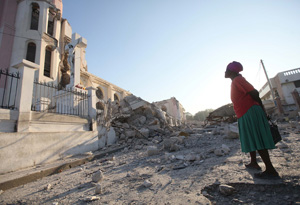Is the World Spinning Out of Control?

Photo: American Red Cross
PAGE 2
Life's instability has seemed particularly cruel this year. January's earthquake in Haiti is estimated to have killed as many as 250,000 people, injured 300,000 more and left more than 1 million homeless. The magnitude 8.8 earthquake that rocked Chile in February was violent enough to move the entire city of Concepcion at least 10 feet to the west. Smaller rumblings of the Earth's crust have occurred in Indonesia, Mexico, Turkey, Taiwan, China and even Chicago in the past few months. Add to that terrorist acts, wars, genocide, nuclear proliferation, rising temperatures, melting icecaps. Does it seem that things are becoming less and less stable here on Planet Earth?
I think the answer to that question is both no and yes. Let's start with the "no" part of the answer: No, I don't think things are less stable here on Planet Earth. According to the U.S. Geological Survey, the earth usually has one magnitude 8 or higher earthquake per year, some 17 quakes between 7 and 7.9 and roughly 132 earthquakes a year with a magnitude of between 6 and 6.9. Thus, the recent earthquakes are not abnormal in frequency, scientists say, but have received more attention because of the loss of human life and the almost constant flow of news around the world.
And what about terrorism, war and global hostilities in general? Dr. Steven Pinker, who is a professor in the department of psychology at Harvard, writes: "We are probably living in the most peaceful moment of our species' time on earth." Sound improbable? Pinker gives examples of much more brutal periods of history, including 16th-century Paris, when a popular form of entertainment was cat-burning, whereby a cat would be lowered by a sling into a fire. The spectators, including kings and queens, would shriek with laughter as the animals howled with pain and burned to death. "Today," says Pinker, "such sadism would be unthinkable in most of the world. This change in sensibilities is just one example of perhaps the most important and most under appreciated trend in the human saga: Violence has been in decline over long stretches of history. In the decade of Darfur and Iraq, and shortly after the century of Stalin, Hitler, and Mao, the claim that violence has been diminishing may seem somewhere between hallucinatory and obscene. Yet recent studies point to exactly that conclusion."
Now, how about environmental instability? That has to be getting worse, right? There's overwhelming evidence that global warming, brought on by too many human beings burning too much fossil fuel and taking up too much room on our crowded planet, is changing the nature of life on earth. But before we get into that, may I just remind you that massive changes to the earth's climate and terrain and species have occurred throughout the planet's history: ice ages, volcanic eruptions, species loss, continental drift and even collisions with asteroids, one of which may have wiped out the dinosaurs.
The false security of modern life
I think the answer to that question is both no and yes. Let's start with the "no" part of the answer: No, I don't think things are less stable here on Planet Earth. According to the U.S. Geological Survey, the earth usually has one magnitude 8 or higher earthquake per year, some 17 quakes between 7 and 7.9 and roughly 132 earthquakes a year with a magnitude of between 6 and 6.9. Thus, the recent earthquakes are not abnormal in frequency, scientists say, but have received more attention because of the loss of human life and the almost constant flow of news around the world.
And what about terrorism, war and global hostilities in general? Dr. Steven Pinker, who is a professor in the department of psychology at Harvard, writes: "We are probably living in the most peaceful moment of our species' time on earth." Sound improbable? Pinker gives examples of much more brutal periods of history, including 16th-century Paris, when a popular form of entertainment was cat-burning, whereby a cat would be lowered by a sling into a fire. The spectators, including kings and queens, would shriek with laughter as the animals howled with pain and burned to death. "Today," says Pinker, "such sadism would be unthinkable in most of the world. This change in sensibilities is just one example of perhaps the most important and most under appreciated trend in the human saga: Violence has been in decline over long stretches of history. In the decade of Darfur and Iraq, and shortly after the century of Stalin, Hitler, and Mao, the claim that violence has been diminishing may seem somewhere between hallucinatory and obscene. Yet recent studies point to exactly that conclusion."
Now, how about environmental instability? That has to be getting worse, right? There's overwhelming evidence that global warming, brought on by too many human beings burning too much fossil fuel and taking up too much room on our crowded planet, is changing the nature of life on earth. But before we get into that, may I just remind you that massive changes to the earth's climate and terrain and species have occurred throughout the planet's history: ice ages, volcanic eruptions, species loss, continental drift and even collisions with asteroids, one of which may have wiped out the dinosaurs.
The false security of modern life



